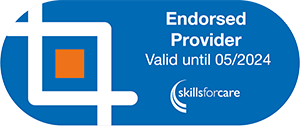Covid-19 increased awareness of infection control measures (such as effective hand washing) in the general population. The pandemic has also seen additional safeguards being introduced in care homes, such as social distancing and restrictions on visitors. The CQC has issued updated guidance on effective prevention measures that all homes should be following.
The reality is that robust infection control has always been an essential and non-negotiable requirement for any care provider. In the current climate it has a higher profile than ever. Perhaps it’s a good time to take stock of your procedures and how confident your staff are in following them.
As we are well aware elderly residents can be less resilient when it comes to fighting off common infections such as Norovirus and flu. Not only are they are more likely to catch infections, the elderly can often experience more severe symptoms. With Covid-19 the implications of an outbreak may be fatal.
Isolating Infections
Care home residents also live in an environment in which they share facilities with other people and where infections can spread easily. Effective control measures recognise this and include procedures to ensure that infection sources are isolated and neutralised.
CQC’s recent undertaking of infection control thematic inspections have revealed the two areas of biggest concern are regarding the effective use of PPE and care providers having up to date policies. 45% of the providers that experienced a thematic inspection in August did not meet the criteria. Would you? Would your staff?
It’s important to remember that the most effective control is to prevent infections from entering the home in the first place. However, that is not always achievable. Hygiene procedures that relate to visitors and deliveries are as important as those that cover food preparation and delivering personal care. Staff teams have a huge amount to consider during this particularly challenging time. Have you adequately prepared your staff to manage the risks and also cope with worst case scenario?
Good Hand Hygiene
Effective hand washing and decontamination underpins all of the infection control measures, particularly in these situations where infection risks are highest: just before and after providing care, any time you are exposed to bodily fluids, after touching potentially contaminated surfaces and as soon as you remove protective gloves or other PPE.
Use and disposal of PPE, waste management and the handling of sharps are other important aspects of infection control that demand particular attention.
Procedures are pointless if the people who need to follow them don’t understand them or the reasons that they are in place. That’s why CQC inspectors are highly likely to explore issues such as staff training and competence to be certain that effective controls exist in practice as well as on paper.
To help care providers with infection control requirements and help to disseminate information to care staff, Redcrier has launched a free infection control course. This course covers all aspects of the measures that care staff need to follow both during the current pandemic and into the future.
To download the free course here or contact Redcrier on 01823 33 22 00 for more information about any of your staff training requirements.








